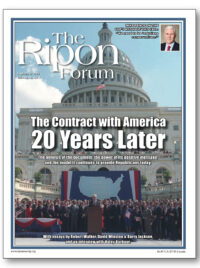 When Haley Barbour became Chairman of the Republican National Committee in 1993, the prospects for the GOP’s future looked rather grim.
When Haley Barbour became Chairman of the Republican National Committee in 1993, the prospects for the GOP’s future looked rather grim.
The party was coming off an election that saw it lose the White House for the first time in 12 years, and Democrats were led by a charismatic young President who came to town armed with hope and a theme song by Fleetwood Mac.
On the Hill, Republicans had been out of power for nearly four decades. But instead of resigning themselves to their minority status, Republicans decided to present the American people with an alternative.
Led by Barbour at the RNC and then-Minority Whip Newt Gingrich in the House, Republicans spent the better part of the next 18 months carrying on a dialogue with the American people about what Congress would look like if the GOP were in control.
They sent out questionnaires. They held town meetings. They asked people what they thought. And then six weeks before the 1994 mid-term elections, they gathered on the steps of the U.S. Capitol to sign the Contract with America and tell people exactly what they intended to do. The rest is history.
The Forum spoke recently with Governor Barbour about the Contract and its role in the ‘94 elections, as well as the issues and messages that he believes Republicans should focus on this year.
____________________________________________
RF: How important was the Contract with America to the Republican Revolution of 1994?
HB: The Contract with America was very important in 1994, not only because of the policies it promoted but because it gave people something to vote for.
RF: As Chairman of the RNC, you famously placed an ad in TV Guide so that all Americans could have a copy of the Contract if they wanted. In this age of Facebook and Twitter, if you were marketing the Contract today, how would you sell the document and get your message across?
HB: We took out the ad in TV Guide because we thought it was the most broadly circulated publication targeting middle class and working class families at the time. That was our target audience, and they voted very strongly for Republicans in 1994.
Frankly, I’m not even sure if they still publish TV Guide. But I do know that any marketing campaign you undertake today has to incorporate social media, which means reaching people not only though the printed page, but through their iPads and iPhones, as well.
RF: Along those same lines, if you were writing a Contract with America for 2014, what are some of the ideas and policy proposals you would include?
HB: In the Contract with America, we emphasized the issues and policies that united us as Republicans – smaller government, less spending, lower taxes, rational regulation, a market-based economy, safe streets, peace through strength, strong families.
The Contract with America was very important in 1994, not only because of the policies it promoted but because it gave people something to vote for.
Today, we would talk about policies that lead to economic growth – job creation that results in higher incomes for more people; a policy that leads to abundant, affordable american energy; a tax policy that saves American businesses from the highest income tax rate in the world and establishes a territorial tax system so these same businesses don’t have to pay incomes taxes twice.
A Contract with America for today would be consistent with the same principles, but the issue set would be different.
RF: Given the fractious nature of today’s GOP, do you think it would be possible to get Republicans to support a Contract?
HB: The fractious nature of today’s GOP is mostly about tactics, not policy. The vast majority of Republicans agree on most of these issues.
In fact, I think 90 percent of people who consider themselves Tea Party voters agree on almost every issue with people who consider themselves regular Republicans. It’s the tactical stuff that has created the fissures.
RF: What message – or messages — do you believe Republicans should campaign on this fall?
HB: I think we should emphasize economic growth, job creation, higher incomes, and a health care system controlled by doctors and patients instead of federal bureaucrats.
The fractious nature of today’s GOP is mostly about tactics, not policy. The vast majority of Republicans agree on most of these issues.
We can’t tolerate two percent economic growth if we expect our children and grandchildren to live in the same country we grew up in – a country with unlimited opportunity for all and more prosperity and freedom than the world has ever known.
RF: Finally, what is your prediction for November 4th – how will Republicans do?
HB: I think Republicans are more likely to win the Senate than not, but we’re not shooting fish in a barrel. I think we will make gains in the House, and about break even on Governors. Right now, there are 29 Republican Governors and 21 Democrats. It’s going to be hard to improve on that.




